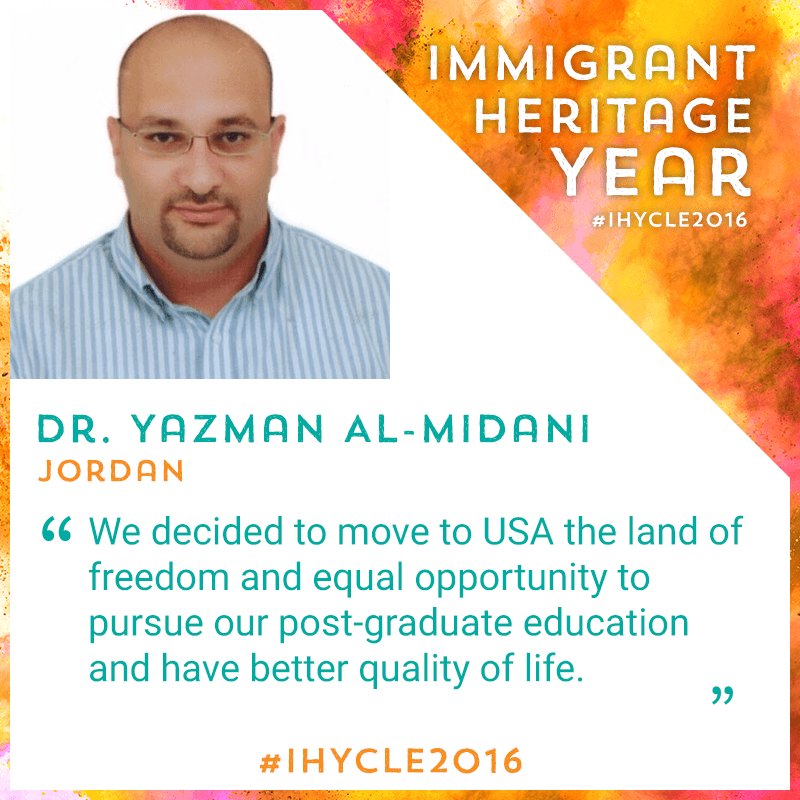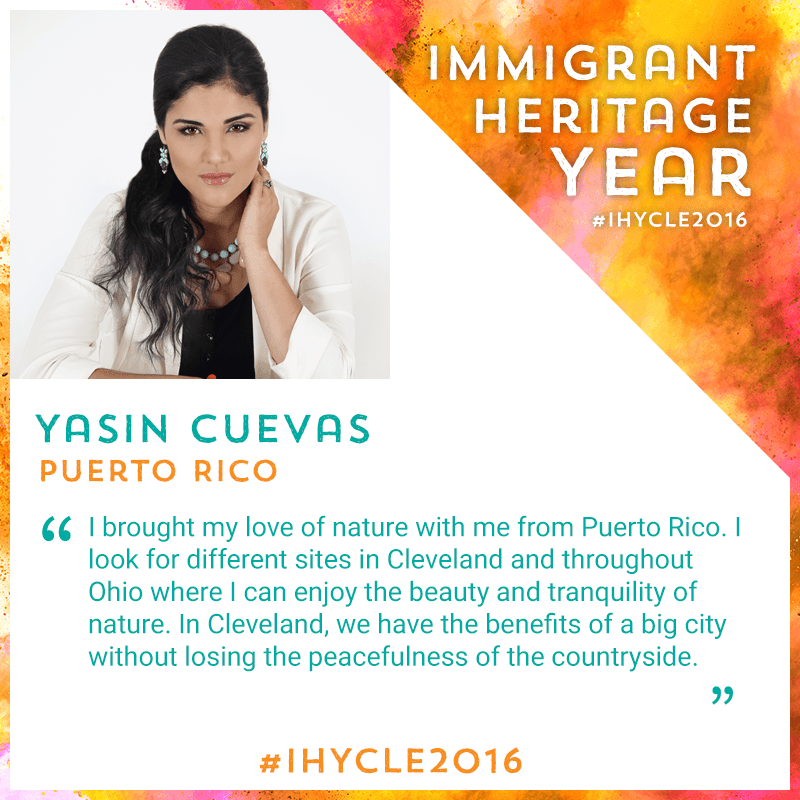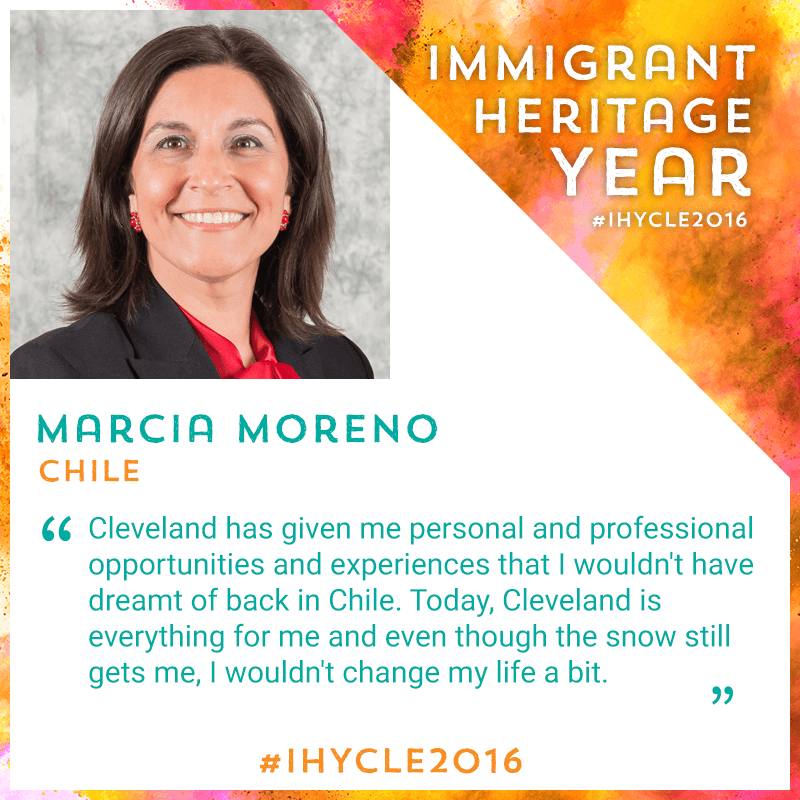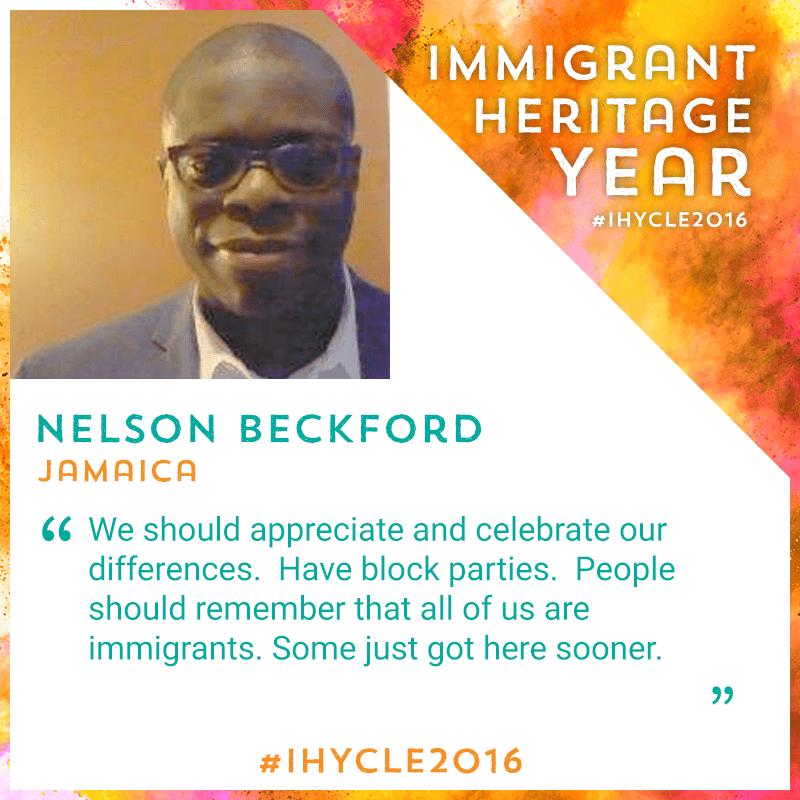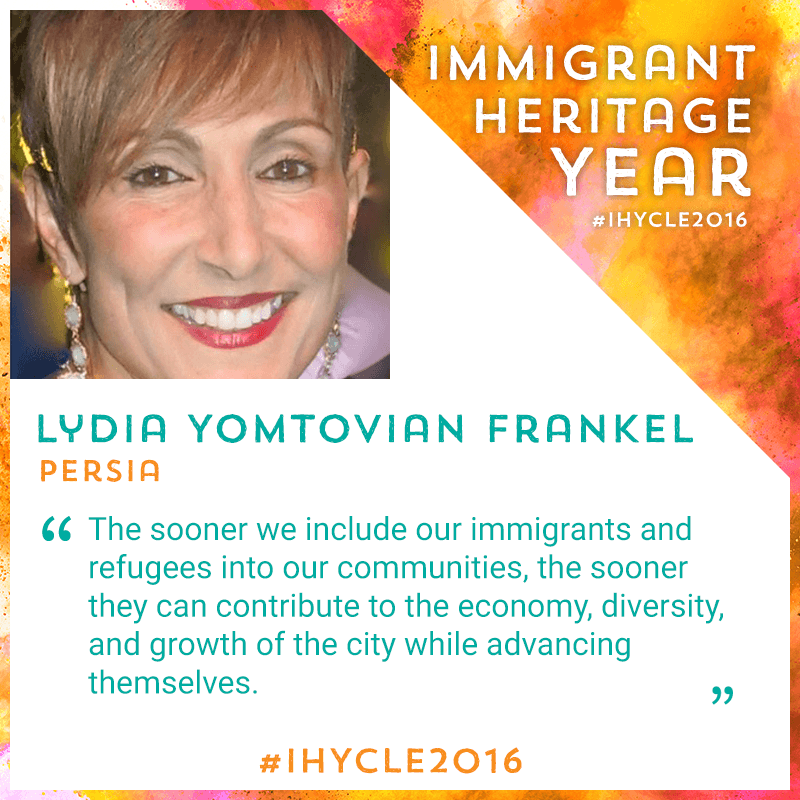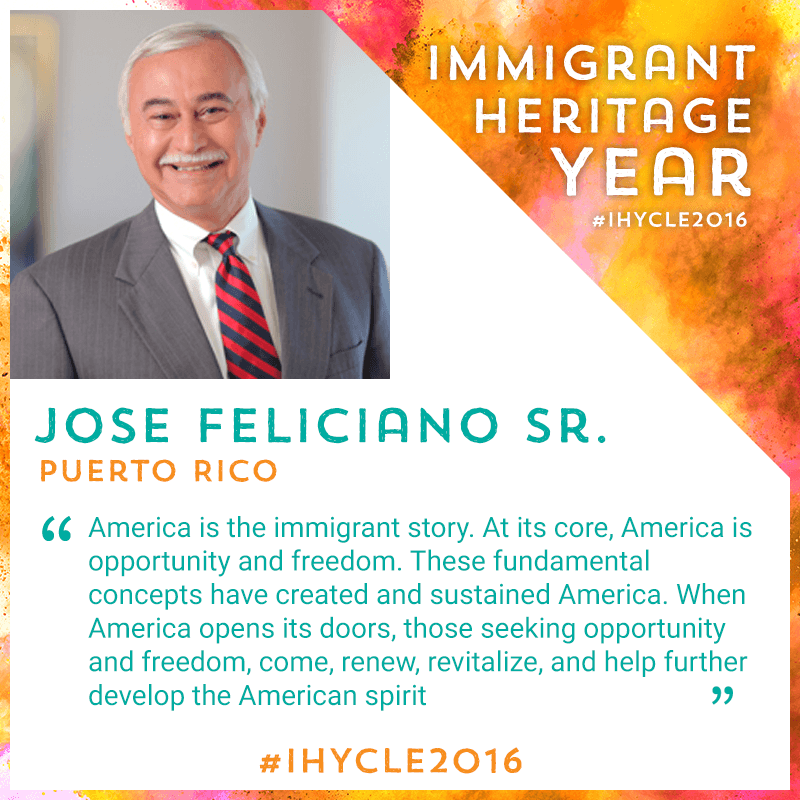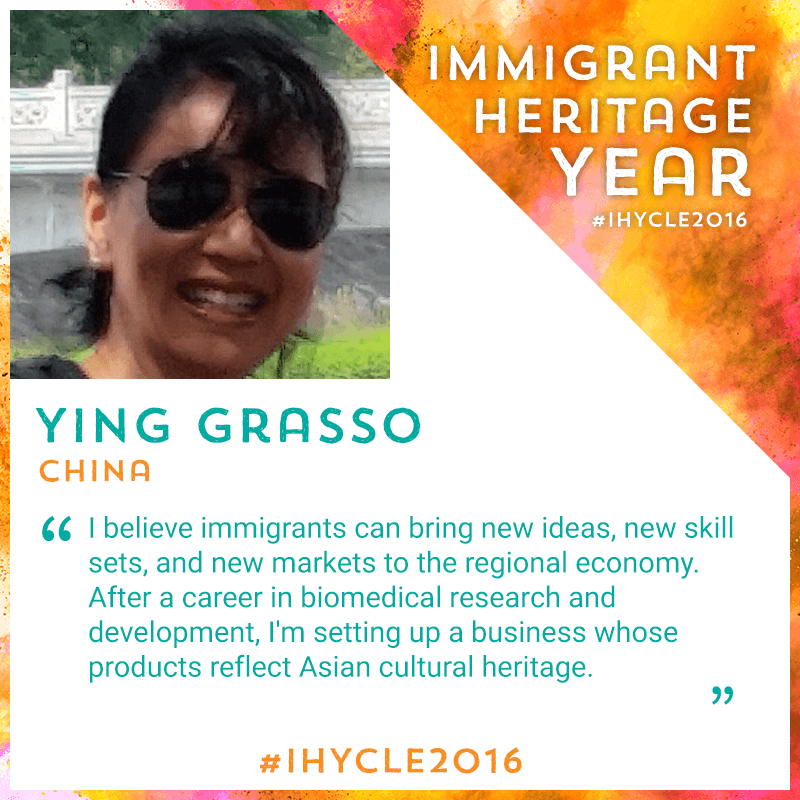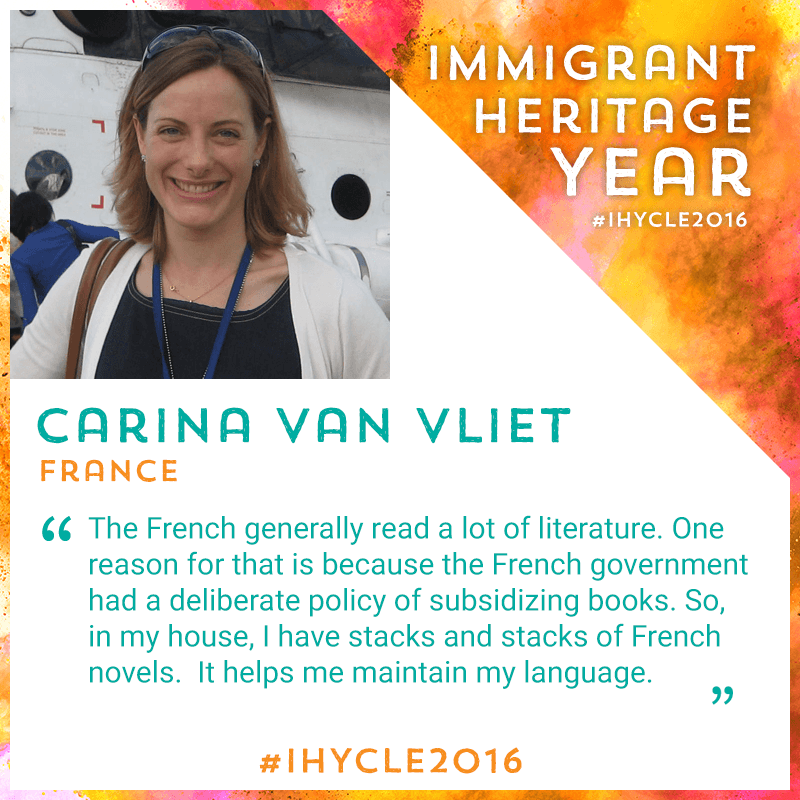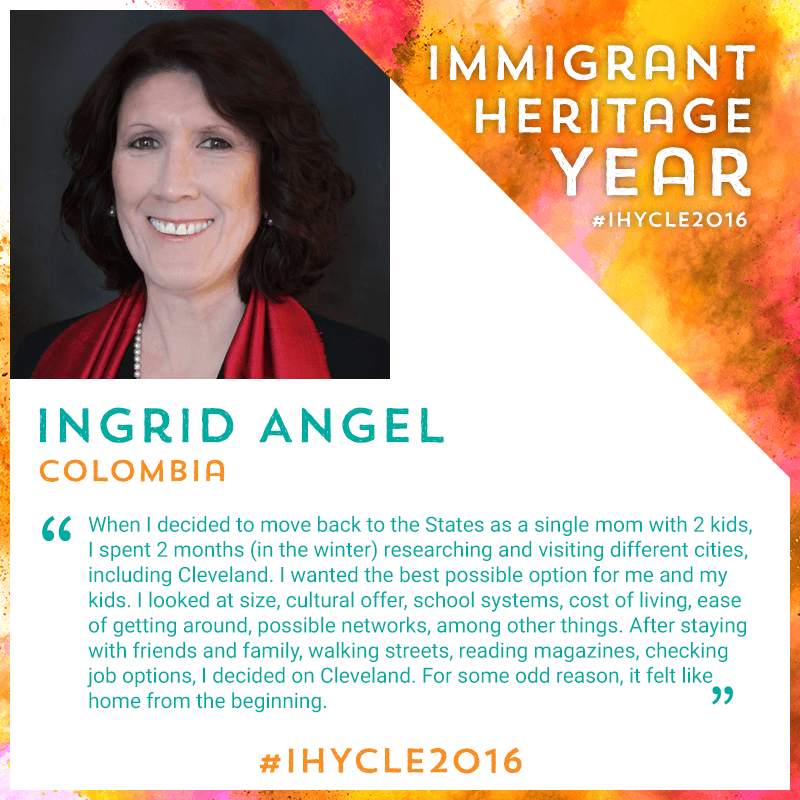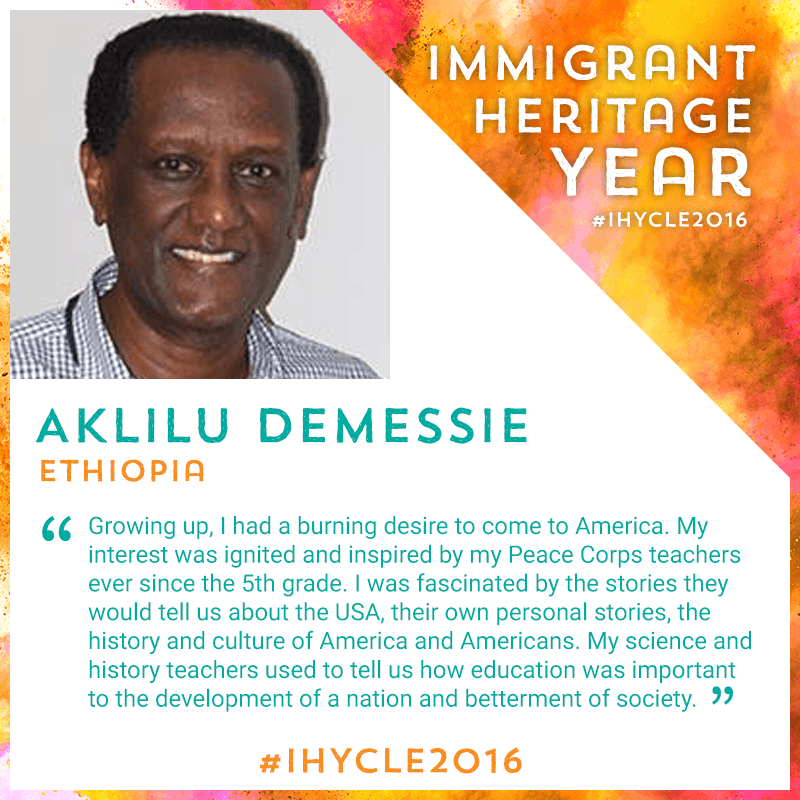Dr. Yazman Al-Midani
Where are you from?
I was born and raised in a small city, Madaba-Jorda, 25 miles south the capital Amman. Madaba, the city of the churches, where there are a lot of old churches, especially my church, ST. George church, which it is very famous with the mosaic map it has, where tourists all over the world come to see it, and I named my son, George after it.
What was it like growing up?
I graduated from school of dentistry in Amman-Jordan, where I met my beautiful wife there, then we started our journey together. We both worked in Jordan and KSA, then we decided to move to USA the land of freedom and equal opportunity to pursue our post-graduate education and have a better quality of life.
Why did you #Choose CLE (What brought you to Cleveland?)?
When I first moved to USA, I spent one year in LA-CA, the city of the dreams, but I have better opportunities in CLeveland, and I do believe that Cleveland is a better place to raise our family.
What were your first thoughts about coming to America? Did those change?
"Home is not just the place where you born, its the place where you become yourself"
"We do not choose our mother, but we love our mother no matter what, but we choose our wives"
We wanted to move to the land of the freedom and opportunities, which I do believe that USA is.
What challenges did you face as an immigrant transitioning here?
I moved from small city, where all people know each other, to a large city where the population in it more than my whole country. Also the cultural and tradition difference played a big role in adapting to the new life we have here.
What is your occupation?
I'm a dentist, I worked in Jordan and KSA and I worked about nine years in in the MetroHealth Medical Center, and currently I'm partner owner in three dental offices in Cleveland area, where we serve the community the best we can.
How have other Clevelanders made you feel welcomed?
In the beginning it was hard, because we did not know many people around us, but with time we feel Cleveland is our home although we do not have immediate family here.
What traditions or customs do you continue to practice?
The Jordanian community in Cleveland is very small, but still we keep some of our traditions, especially regarding our main dish, The Mansaf in certain occasions.
What do you love about Cleveland?
Cleveland became our new home, White Christmas was a dream since I was small kid and it became true here! The thing I like most to do in Cleveland is drinking my favorite coffee from starbucks and watching the sunset on lake Erie.
Why is it so important to welcome immigrants and refugees?
I do believe that help our city in various ways like diversity, more cultural traditions and customs, and I believe that will help our city in all aspects.
What suggestions do you have to make Cleveland a more welcoming community?
In general Cleveland is very welcoming community, but we can put some more efforts through the various diverse communities we have to facilitate and improve the opportunities for well qualified people to move in our city.
Yasin Cuevas
Where are you from?
I am proudly from Utuado, Puerto Rico.
What was it like growing up?
I grow up in Utuado, Puerto Rico, a town located in in the central-western mountainous region of the island. Growing up around mountains gave me the opportunity to appreciate and love the natural environment as well to understand that happiness comes from simple moments.
What brought you to Cleveland?
Years ago, my father was diagnosed with cancer and Metro Hospital provides some of the best care for cancer patients. He died 3 years after but we were all so grateful for the amazing care he received while there. My mother decided to stay in Cleveland and I moved here with her in 2006.
What were your first thoughts about coming to America? Did those change?
I had the impression that it was a community separated into groups and culture, a fast-living country where work came first and family was the last priority. With time, I have learned that the communities are actually trying to break these barriers and become more united. I still continue to believe that work is a high priority but it is up to each individual to find the balance between work and family time.
What challenges did you face as an immigrant transitioning here?
Learning the language was a big challenge. Understanding that no matter how much try, you may never completely learn the language. This has always been a frustration but I continue to improve in my interactions with others.
What is your occupation?
I work as a Program Coordinator at Esperanza, Inc. helping high school students to create and reach for their own personal educational and community goals. I am also the founder of Project Model Institute and the Director of the Miss Ohio Latina state pageant where the queens represent each state at the Miss US Latina competition.
How have other Clevelanders made you feel welcomed?
I have received a lot of support for many of my projects and initiatives from the Cleveland community.
What traditions or customs do you continue to practice?
I continue to celebrate Three Kings Day/ El día de los tres reyes magos which we celebrate each year on January 6th. We received our Christmas gifts on that day, in commemoration of the Magi's visit. On La Víspera de Reyes (the Eve of Three Kings Day) we cut grass to put in a shoe box under our bed for the camels to eat and in exchange for the gift we receive. I don’t cut grass anymore but we do continue the tradition in our family.
What do you love about Cleveland?
I brought my love of nature with me from Puerto Rico. I look for different sites in Cleveland and throughout Ohio where I can enjoy the beauty and tranquility of nature. The Metro Parks and University Circle are some of my favorite areas in the city. In Cleveland, we have the benefits of a big city without losing the peacefulness of the countryside. It’s the best of both worlds and I feel like sometimes those who have lived here for many years do not appreciate it.
Why is it so important to welcome immigrants and refugees?
Immigrants to our country bring so much knowledge and so many talents along with their culture and their perspectives on diversity. I have found that immigrants find great value in the benefits and the opportunities here in the United States.
What suggestions do you have to make Cleveland a more welcoming community?
I think Cleveland should work to better promote their services available to immigrants and refugees so that the community knows more about what support is offered. I also think that assistance with transportation is necessary for our immigrants so that they are able to find services that will help them to establish their new lives here.
Marcia Moreno
Where are you from?
I am from Chile
What was it like growing up?
I grew up in the 80s under Pinochet's dictatorship but most of my teen years were under a democratic government. I was raised in Santa Cruz, Chile's central Valley, wine country today. I had a pretty happy childhood, very sheltered, family oriented. I went to Catholic school and then for College, I went to Universidad de Concepcion, and studied Journalism. Even though my parents were never involved in politics, music was their way to show me and express what their values, ideas and principles were at that time, and now. It is a happy memory now but it was not at the time, when I would wake up to the music of Victor Jara, Violeta Parra or Inti Illimani a very early Sunday morning, and both my parents would sing their songs and would tell me that one day I would love it too... and I did, I do.
I did not have the things kids have now either, of course. We only had 2 national TV stations with very restricted programming: the National TV and the Catholic TV; our main entertainment was going outside to play with my neighborhood friends and renting a VHS movie for the weekends. We travelled often to visit family in other towns and that was also a highlight of my childhood: my cousins, who I still love and miss with all my heart.
What brought you to Cleveland?
During my years at Universidad de Concepcion I had a professor that had a working relationship with the Dean of the College of Business at CSU. After working on a few research projects together, we became friends, and he and the College of Business gave me an opportunity to come to CSU to pursue my master's degree under an international exchange program between both universities. That was 11 years ago, this August. I was given an opportunity and I took it. Almost like Cleveland chose me, in a way.
What were your first thoughts about coming to America? Did those change?
I was supposed to come to Cleveland for 2 years, get my master's degree, and head back home, where a job at the University of Concepcion was waiting for me. I did not see myself living in the US, at all. I wanted to take advantage of a once in a lifetime opportunity to learn English, advance my academic career and go back. It was especially hard for me to adjust the first few years, and the weather and living Downtown did not help. I wanted to leave. So my experience here was always feeling like a passenger, not in a long term relationship with Cleveland, or the US. and that was 11 years ago…
Those first 2 years have been the hardest of my entire life, but at the same time, they taught me so much and they made me the person I am today, the person that decided to stay here in Cleveland, and form a family. And yes, my first thoughts about US and Cleveland DID change, a lot!
In Cleveland I met the 2 loves of my life, my husband, Joe, and almost 4 years ago, our son, Teddy. Cleveland has given me personal and professional opportunities and experiences that I wouldn't have dreamt of back in Chile; In Cleveland I met my best friends, my sisters, and they have been my back bone to endure some of the hardest lessons in life. Today, Cleveland is everything for me and even though the snow still gets me, I wouldn't change my life a bit.
What challenges did you face as an immigrant transitioning here?
I see mainly two biggest challenges: the language and the customs, norms, rules of the day to day living in another country. I was proficient in English but mostly at a technical, academic level that allowed me to pursue my degree; day to day English was super hard for me, as I did not have much experience with it. Speaking was also a lot harder to overcome than writing or reading. Language barriers, when mixed with a total disconnect from the customs, is not a good start. And yes, people may think they know a lot from movies and the internet; but you don't live in a movie: you need to rent a house, get a phone, pay your bills, order food, get a credit card, pay your taxes, and you have NO idea how to do that and nobody teaches you that! How things work in a country are the hardest to learn, and understand, because people were born with those rules, norms, traditions, customs and they seem so obvious and common sense, but they are not if you have not lived here before.
What is your occupation?
I am the Diversity and Talent Manager for Thompson Hine, LLP.
How have other Clevelanders made you feel welcomed?
Most of the "Clevelanders" I know are immigrants that settled in Cleveland, just like me. Most of them are from Latin America. And, since they have lived what I lived first hand, they have been the best at making me feel welcomed. I was always invited to family reunions, parties, networking events, that allowed me to meet new people and broaden my network, but mostly, feel at home. Later on, my husband and his family opened their doors and hearts and welcomed me to their lives. I think that being invited to family events, traditions or national holidays makes you feel like being part of something bigger, and I have appreciated that immensely.
What traditions or customs do you continue to practice?
As many as I can but in practice two: Celebration of Independence of Chile, in September 18, and celebrating Christmas on December 24, at midnight. The Chilean independence is one of the biggest celebrations in Chile and I have tried to maintain it with my family and friends. We usually get together with other Chilean friends and have a barbeque, music and drinks. The Chilean flag hangs out our front door all month, in honor of my home country.
For Christmas, we invite my in laws and we have a Chilean style dinner at our place on December 24, and later, we open presents. It has worked perfectly for us (and specially for our son), because we get to celebrate, eat and open presents twice: Christmas Eve and Christmas Day.
What do you love about Cleveland?
The different foods and restaurants you can try; the Metroparks; Blossom and the orchestra; the libraries, the big and strong non profit community and the importance of charity, volunteerism and support to people with needs.
Why is it so important to welcome immigrants and refugees?
I know it is a cliché but is true, everybody in this country is an immigrant and immigrants made and continue making this country great. We need to become part of this community, contribute to it, make it richer and stronger, and in order to do that we need to be at our fullest; if we feel like we belong and that our lives matter we will soon become advocates and contributors, and not a burden. We don't want to be a burden, but without a welcoming community, it is harder to reach our potential.
What suggestions do you have to make Cleveland a more welcoming community?
After 11 years in Cleveland I would like to say that I am proud of living here, as a first generation immigrant. I feel welcome and appreciated. However, there is still a lot of misinformation and ignorance about international professionals and the options for work visas. My one suggestion would be to those companies that are still reluctant to hire professionals from other countries:the only way to remain competitive and relevant is to bring to the table people with different backgrounds ideas, opinions and worldviews, and allow them to be creative and, again, reach their potential. Take a leap of faith and more often than not, you will be extremely surprised.
Nelson Beckford
Where are you from?
Kingston, Jamaica
What was it like growing up?
I recall feeling connected to my neighborhood, a place called Elleston Flats. I remember block parties and street festivals. Music. Lots of music at home and outside. I also remember my school (Hope Valley Experimental School) which promoted the educational and emotional development of disabled and able-bodied children simultaneously. I learned about empathy.
What brought you to Cleveland?
This girl and college. The girl is now my wife.
What were your first thoughts about coming to America? Did those change?
I lived in Queens, NYC before Cleveland. My first thought: cold and snow. I learned to love the change of seasons especially the fall. I can now tolerate the cold.
What challenges did you face as an immigrant transitioning here?
Minor ones. I was lucky. I grew up in Queens which is so multicultural - I did not stick out.
What is your occupation?
I work for a local foundation and do foundation stuff.
How have other Clevelanders made you feel welcomed?
A pivotal invite came to me from an elected official soon after we moved to Ohio City in 1998. This high energy official invited me to a meeting. I also got to know and become friends with some of my neighbors – some truly incredible people.
What traditions or customs do you continue to practice?
This notion of community – people that live close to another should and must help one another.
Also the idea of celebration; taking time to live, laugh and appreciate the moment.
What do you love about Cleveland?
It’s spirit, history, neighborhoods, and its natural systems.
Why is it so important to welcome immigrants and refugees?
Because the economic development case for it has already been proven. In terms of social justice, it is the right thing to do.
What suggestions do you have to make Cleveland a more welcoming community?
We should appreciate and celebrate our differences. Have block parties. People should remember that all of us are immigrants. Some just got here sooner.
Lydia Yomtovian Frankel
Where are you from?
I am from a lot of places, multiple countries, cultures and languages. I was born in Tehran/Persia to a family that can trace its roots in Persia for at least 11 generations. We moved to Israel when I was 7 years old. Most of my parents’ family moved to Israel once the Jewish state declared its independence in May, 1948.
What was it like growing up?
Fortunately, I grew up in a warm and loving family with a very large extended family in Tehran/Persia. We celebrated Jewish holidays at my parents’ house with all of my uncles, cousins, and grandparents (over 50 people at least). However, at an early age I remember my Muslim classmates and teachers treating me as a Jewish kid – second class. I was never invited to birthday parties and no classmate was willing to come to my house. Teachers would single me out as a Jewish student. As a young child who was born and raised in a discriminating environment, sadly, I accepted it as the norm. My father talked about moving to Israel for over 7 years before he actually cut our strong roots from Iran and moved to Israel. I was 7 years old when we moved and I was very eager to finally be part of the Jewish state. However, I had no knowledge of the Hebrew language and culture so again, I was a minority. But after a short period of time I was able to speak the language fluently and gradually felt Israeli, making friends for life.
What brought you to Cleveland?
When I decided to move to the USA, I moved to Minnesota and graduated in computer science and engineering from Univ. of Minnesota. Once graduated, I wanted to move as far away from the harsh winter of Minnesota as possible. Luckily, I got a position at NASA Ames in Silicon Valley, CA and had no intention of ever living in a place that gets snowy and below 32F again. I had never expected that my future husband would have been born and raised in Cleveland and would absolutely love Cleveland. He is its biggest advocate and can convince anyone that Cleveland is heaven on Earth. Therefore, in the end, I made my way to a place that has some serious lake effect snow and very long, cold winter days.
What were your first thoughts about coming to America? Did those change?
I thought of educational opportunities and personal growth. These thoughts never changed.
What challenges did you face as an immigrant transitioning here?
Moving to any new place away from family and friends is very difficult, especially during holidays. In particular, the challenge is finding a supportive community.
As an Israeli, I continuously face unbalanced news and feel the heavy responsibility of advocating for Israel.
I find that even after 20+ years in USA, I am still treated as an outsider. Most American are less in tune with different accents, so even if a person speaks the language very well, he/she still gets this puzzled expression on his/her face when a word is not accented ‘correctly.’
Moving to Cleveland and finding a high tech position was very frustrating and difficult. Still today, there are very few high tech companies and very few networking opportunities in this industry in Cleveland. I found my first job in Cleveland through my connections in Silicon Valley.
Clevelanders have very short memory of the winter season here. They never prepare you for the very long, harsh, and icy roads that are prone to accidents.
What is your occupation?
I worked as a computer engineer with an emphasis in numerical analysis, which was the more scientific end of computing. I worked at NASA Ames in California and later at NASA Glenn until I moved on to a full time lay leader in the Jewish Community.
How have other Clevelanders made you feel welcomed?
At first, it was very hard to break into the rooted Clevelanders’ community, especially as a professional and a recent married women. People were nice but most Clevelanders are born and raised here, and have established life-long friendships or have so much extended family here it seemed as though they didn’t feel the need to make any new friends. Only after having children did I start to feel more connected to Cleveland, and through them I was able to build amazing and supportive friendships and feel part of the community.
What traditions or customs do you continue to practice?
I continue celebrating Jewish holidays adding on my Persian/Israeli customs and traditions; hosting Shabbat dinners with family and friends with the traditional Israeli/Persian cuisine.
What do you love about Cleveland?
It is one of the best places in the USA to raise grounded, highly educated children committed to giving back to their communities and who have high values. Cleveland has wonderful parks, arts and culture, and it is very easy to get around.
What is the best thing about living in Cleveland?
Cleveland offers easy and affordable access to one of the best national and international arts and cultural programs, parks, sport teams, and great Jewish community.
Why is it so important to welcome immigrants and refugees?
The sooner we include our immigrants and refugees into our communities, the sooner they can contribute to the economy, diversity, and growth of the city while advancing themselves.
What suggestions do you have to make Cleveland a more welcoming community?
Any city in the USA will benefit from extended knowledge of other cultures, countries and languages in order to be more effective in transitioning new-comers to the existing communities. If the environment is built to give these new-comers more opportunities to succeed in the US, then they will be a great asset to our cities and our communities.
Jose Feliciano Sr.
Where are you from?
I was born in the hills of Puerto Rico in a small town called Yauco.
What was it like growing up?
I grew up on the near West side of Cleveland in what now is known as Ohio City. I lived across the street from St. Patrick's school and church on Whitman Avenue. I probably served more 6:30 AM masses than any altar boy in the history of St. Patrick's Church, because I would often get to the church before the priests, sometime ringing their doorbell to get them going. I thought that by doing a good job serving 6:30 AM mass, I would get promoted to 7:30 AM or 8:30 AM masses. I found out that no good deed goes unpunished, and so for my conscientious work was awarded almost permanent duty serving 6:30 mass, because others had difficulty doing it. I learned one of the great lessons of life through this process, however: discipline and reliability.
Saint Patrick Church, a historically Irish parish, was one of the centers of my life, providing a wonderful education, CYO youth activities, athletic facilities, such as the gymnasium in the school and the outdoor basketball court, opportunities for leadership, such as coaching the CYO baseball team and serving on the parish council. Another center was the Franklin YMCA where I learned how to compete in athletics, including competitive swimming, baseball, and basketball preparing me to play and start in basketball and baseball at Cathedral Latin high school and playing on several Cleveland sandlot championship baseball teams.
The near West side was a fairly typical blue-collar neighborhood that was closely knit and watched out for one another, composed of Hispanics (particularly Puerto Ricans), Irish, Italian, Poles, and many other eastern European. It was an absolutely extraordinary supportive and loving neighborhood and community.
What brought you to Cleveland?
My parents chose Cleveland Ohio. My dad, who served the United States military for seven years, moved to Cleveland in 1952 when it was the sixth largest city in America, having nearly 1,000,000 people in the city limits. He then sent for his family from Puerto Rico.
One of his brothers was working in a steel plant and got him a job. He later worked for the White Motor Corporation for 30 years, rearing two boys who became lawyers and one girl who became a teacher.
What were your first thoughts about coming to America? Did those change?
I arrived in Cleveland at age 2 and really look upon Cleveland as my home. I have no memory of the transition.
What challenges did you face as an immigrant transitioning here?
The most significant challenge I faced growing up was language. I did not speak English until I was six years old. I initially started school in the Cleveland public schools, attending what was then known as Kentucky school on West 38th near Franklin. I learned as an adult, from a friend who reviewed my first grade records that I had been identified as Educable Mentally Retarded (EMR). That is when schools were practicing tracking. I transferred to St. Patrick's school after several months. There, with the help of the Ursuline nuns, I learned English rather quickly, probably in several months
Although I am a product of complete immersion, I am a very firm believer in bilingual education. I had an enormous support system allowing me to learn English so quickly. Many others, unfortunately, do not. At the end of the day, the purpose of bilingual education is to teach English, sometimes something which gets lost in the political translation.
Growing up, I aperiodically was called a “spic" and have felt the pain associated with that, but the opportunities, friendships, and love afforded to me on the near West side far outweighed that unpleasantness.
What is your occupation?
I have been practicing law 41 years and am currently a partner with the national 900 lawyer law firm of Baker Hostetler. I began my career as a legal services lawyer, where I worked for the Cleveland Aid Society for four years. Thereafter, I served as a Cuyahoga County Public Defender for three years. In 1980 at age 29, I became the first Hispanic public official, and one of the youngest cabinet level officers, in the history of the city of Cleveland when then Mayor George Voinovich appointed me the Chief Prosecuting Attorney. Thereafter, I served as a White House Fellow in the administration of President Ronald Reagan in 1984 through 1985. Thereafter, I joined the law firm of Baker Hostetler where I have worked for more than 30 years.
How have other Clevelanders made you feel welcomed?
Cleveland has been extraordinarily welcoming, supportive, and loving to my family and me, affording me a wonderful standard of living and extraordinary service opportunities, including serving as the President of the Cleveland Bar Association and serving on the boards of numerous civic organizations including the Cleveland Clinic, John Carroll University, and the Greater Cleveland Partnership to name but a few. Mostly it has given me the gift of service to my own people beginning in college working with the Spanish-American Committee, serving as their General Counsel while a legal services lawyer and thereafter, providing for the opportunity to found and serve the Hispanic Roundtable, where I am now honored to serve as chairman.
What traditions or customs do you continue to practice?
My children and I treasure the celebration of family life, particularly holidays and Sunday meals. The Puerto Rican music, the smells of tostones smothered in garlic, rice and beans, and pernil are staples in our life. Coquito, Puerto Rican eggnog, during the holidays is a must. Sundays are glorious family days of fellowship and love. Our music, particularly Puerto Rican ballads and salsa music are an especially meaningful part of our lives.
My three children all bear Hispanic names: José Celso, Rebecca Catalina, and Marisa Cristina. They all have a very clear Puerto Rican identity, and they love.
The identification and celebration of the success of outstanding artists, such as Rita Moreno, great baseball legends, such as Roberto Clemente, and outstanding political leaders such as former Sec. of HUD Henry Cisneros and current Sec. of Labor Tom Perez are a part of our lives. So is the tradition of service to Hispanic civic organizations and giving back to our community.
What do you love about Cleveland?
I love almost everything about Cleveland: the friendliness and openness of our community , the quality of life, the economic and civic opportunities, the professional sports, the museums, the theater, the restaurants, the housing, the educational opportunities, and the reasonableness of the cost-of-living just for starters.
Why is it so important to welcome immigrants and refugees?
America is the immigrant story. At its core, America is opportunity and freedom. These fundamental concepts have created and sustained America. When America opens its doors, those seeking opportunity and freedom, come, renew, revitalize, and help further develop the American spirit from Alexander Hamilton at the founding of America to the creator of Google, Serge Brin and the creator of Yahoo, Jerry Yang..
What suggestions do you have to make Cleveland a more welcoming community?
A significant objective should be to improve the atmosphere of acceptance, particularly of those who speak a different languages. Governments, particularly at the local level (the city of Cleveland, and all nearby cities, as well as Cuyahoga County) should pass resolutions encouraging immigrants from all over the world. The federal government, of course, needs to pass comprehensive immigration reform. There needs to be the encouragement of dual language in schools. Public signage should be encouraged in different languages in communities where there is a natural congregation of ethnic groups, such as in Saigon Plaza for the Asian community and Clark Fulton for the Hispanic community.
Land-use strategies, making all these vacant lots available to immigrants for sweat equity and other incentives, can help revitalize urban blight, and our urban planners need to develop aggressive strategies in this area.
Ohio needs immigrants for its economy and for demographics for the Census. Labor markets do not appear to be working effectively in the Cleveland area where there is relatively high unemployment yet many jobs go unfilled. Immigrants do not take jobs away from people, they fill jobs which are unfilled. Ohio needs immigrants at the top of the ladder, the middle, and at the bottom. Dr. Toby Cosgrove needs more doctors at the Clinic, we need more entrepreneurs to start small businesses and grow them, and we need service workers in restaurants, nurseries, and hotels. Ohio has lost Congressman in the last two census, and we need more people in order to preserve our congressional delegation. These basic conclusions were documented and reached by the recent study of the Chicago Council on World Affairs analyzing immigration in the Midwest.
At the risk of being a one trick pony, let me comment on Hispanics. The largest minority group in the United States is Hispanics. A special strategy should be developed to encourage their migration and immigration here. While the population the city of Cleveland has been declining, Hispanics have been increasing, thereby helping the city preservice population at or about 400,000, a very significant number four congressional appropriations.
We need Hispanics, their hard work, their drive for success, and their commitment to their family and to God. They can help renew and revitalize our area.
Ying Grasso
I grew up in Shanghai, China and came to the States to attend graduate school in Connecticut. After defending my PhD thesis I came to Cleveland to work at the Cleveland Clinic. Fast forward many years, now I have a family here with 2 teenage children. Both my kids have studied Chinese. My daughter has performed Chinese Classical Dance many times at the annual Cleveland Asian Festival, and I have been a volunteer. I love Cleveland - it has racial, cultural diversity, Cavs, Indians, and Browns, and world class art and music institutions. Clevelanders are friendly, open-minded, and full of entrepreneurial enthusiasm. I believe immigrants can bring new ideas, new skill sets, and new markets to the regional economy. After a career in biomedical research and development, I'm setting up a business whose products reflect Asian cultural heritage. I applaud the mission and effort carried out by Global Cleveland, and I look forward to more collaborations in the future.
Carina Van Vliet
Where are you from?
Cannes, France
What was it like growing up?
There was a huge emphasis on academic performance. By the time I was in high school, classes were from 8:00 a.m. to 6:00 p.m., in addition to Saturday morning classes. Also, there were no school sports. All sports took place as part of a club, after school hours.
What brought you to Cleveland?
My husband is from here. I moved to Cleveland in the fall of 2014. Before I came here, I was living in New York City, where there is a large French expat community. So, I have to say, I was concerned about moving to Cleveland which does not have the same global reputation.
But, two things struck me once I got here. First, I got the sense that a lot of things were happening in Cleveland. Coffee shops, like Phoenix and Rising Star, were opening. Restaurants were opening. There were all these people with small business and non-profit ideas. There was this feeling that Cleveland is a place where things can be created and that there are few barriers to community and professional engagement – or at least much lower barriers than in New York. That was very exciting.
I was also struck by how welcoming the professional community in Cleveland was, in particular Cleveland’s professional women. When I moved, my husband had a job here, but I didn’t. I had to network to find one. People were most helpful in that search. You don’t get that in New York. It’s more competitive there.
What were your first thoughts about coming to America? Did those change?
I came to the United States when I was 17 to attend in college in Maine.
Going to an American liberal arts college was fantastic. It blew my mind. I was able to choose my classes. There was so much freedom.
I was also able to get involved in so many extracurricular things that were not encouraged in France. I became an editor of my college newspaper and got involved in student residential life, in addition to taking dance classes for college credit. I just had so much fun.
What challenges did you face as an immigrant transitioning here?
Americans are typically not very curious about where you come from.
They seldom ask deep questions about your cultural, social or political differences. And yet, other countries do things differently – and sometimes better – than the way things are done here. Sometimes listening to the way other people do things could offer valuable lessons learned and/or alternative models. It’s a missed learning opportunity.
What is your occupation?
I am a former UN diplomat. I currently work in business development.
What traditions or customs do you continue to practice?
Most of them have to do with cuisine. Meals are very important socially. My husband and I love hosting people for dinner. I do traditional French three-course meals, and usually serve French cheese and wine. Also, I will go to great lengths to find a bakery with a good croissant.
The French generally read a lot of literature. One reason for that is because the French government had a deliberate policy of subsidizing books. So, in my house, I have stacks and stacks of French novels. It helps me maintain my language.
I had a baby this winter, and I speak French to him too. I’m also working on getting his French papers. He’ll be a dual U.S.-French citizen.
Why is it so important to welcome immigrants and refugees?
I think civilizations have, traditionally, developed, grown, and transformed through cultural exchange. So it’s good for the United States to attract immigrants, their talents, their world views and their diversity.
With refugees, it’s simply the right thing to do, morally. It’s good for us (they are often very hard working and motivated), and it’s the right thing to do from a human-to-human perspective.
What suggestions do you have to make Cleveland a more welcoming community?
A lot of it is already in progress. If more people move downtown, then more people will interact with each other. The people who live in the suburbs and drive in and drive out each day don’t have a lot of interaction with other people. More interaction will make Cleveland more welcoming.
The more we can create a sense of community, the better. Now, that is truly a tall order. But, I think Cleveland is working really hard to figure it out.
Ingrid Angel
Where are you from?
I was born in Chicago and at age 9 my family moved to Colombia, South America, where I lived for more than 30 years.
What was it like growing up?
Growing up in Colombia was great primarily because of all of the family activities. I have a large family – 92 first cousins and I know them all – AND many of us still stay in touch! Either Saturdays at my Grandmother’s house where the adults would play cards and the kids would just play or large holidays at my uncles’ country homes were always fun and are wonderful memories.
What brought you to Cleveland?
Research. Not in a R&D kind of way, but when I decided to move back to the States as a single mom with 2 kids, I spent 2 months (in the winter) researching and visiting different cities, including Cleveland. I wanted the best possible option for me and my kids. I looked at size, cultural offer, school systems, cost of living, ease of getting around, possible networks, among other things. After staying with friends and family, walking streets, reading magazines, checking job options, I decided on Cleveland. For some odd reason, it felt like home from the beginning.
What were your first thoughts about coming to America? Did those change?
I always wanted to live again in the U.S. as an adult, but didn’t have the chance. I was taking a huge risk, so I wanted to make sure I had all the information to make the best choice possible. I was not disappointed.
What challenges did you face as an immigrant transitioning here?
Twelve years ago the job market was very different from today and even though I had been in Human Resources for over 10 years, I had no idea how to job search here. Things were very different and I had to learn. I had a very bad experience with my first job and even considered going back. Even though I had the best possible “adjustment mentor”, life skills were also a challenge. In Colombia there is no self-service. You have help everywhere and you can only imagine my distress when in the middle of a snowstorm I didn’t know how to put gas in my rental car! I started crying at a pump until a very kind gentleman helped me.
What is your occupation?
I work for The Centers for Families and Children as the Director of El Barrio Workforce Center.
How have other Clevelanders made you feel welcomed?
I have nothing but gratitude towards Cleveland and its people. I married a Clevelander and have made Cleveland our home; that’s how welcomed I feel! I have also met so many people through work that I enjoy interacting with. Everyone is kind, warm and interested in my background.
What traditions or customs do you continue to practice?
My kids (and my husband) will not forgive me if I don’t make occasional Colombian dishes, we continue to follow soccer teams and get together with family based here in the U.S. as often as possible.
What do you love about Cleveland?
The options. If you are in the mood for downtown, there’s so much to see and do. The cultural offer is outstanding. I love the distinct neighborhood vibe of the West side, but I also love the quieter slower pace of the Eastern suburbs. The Metroparks are a gem to have in our backyard. I can go on and on. Hard to peg one thing.
Why is it so important to welcome immigrants and refugees?
This country was founded by immigrants and immigrants have made it great. That has never changed and never should. Diversity of perspective makes greatness.
What suggestions do you have to make Cleveland a more welcoming community?
More education on diverse communities. There is so much misinformation and misconception about certain cultures, creating ignorance and fear. We need more efforts to break down stereotypes and show the benefits of a culturally diverse community.
Aklilu Demessie
I am originally from Ethiopia. I came to the USA at first as an American Field Service (AFS), exchange student to attend Oberlin High School in Oberlin Ohio, in the early 1970s. As an AFS student, I lived with a host family and graduated from Oberlin High in 1971. Living with my host family and getting to know the Oberlin community, gave me an opportunity to learn the American way of life like no other experience would provide at that young age.
Upon completion of my AFS year, I returned to Ethiopia and joined Haile Selassie University (now, Addis Ababa University). However, due to student’s demonstration for political reform, the government closed the university after my first semester. I then returned Ohio to attend Case Western Reserve University where I received my undergraduate and graduate education. I am currently a Senior Engineer at United Technologies Aerospace System, Landing Gear.
Growing up, I had a burning desire to come to America. My interest was ignited and inspired by my Peace Corps teachers ever since the 5th grade, especially my science, English and history teachers. I was fascinated by the stories they would tell us about the USA, their own personal stories, the history and culture of America and Americans. My science and history teachers used to tell us how education was important to the development of a nation and betterment of society.
I believed then as I do now that our world is what we help to make it. The first contribution that one can make to one’s nation is by getting a good education. Inspired by the thoughts and ideas that had been instilled in me by my teachers; I was planning to get an education in the USA and return to contribute to my homeland at the time... However, in the mid seventies, while I was still in school at CWRU, the Ethiopian government was overthrown and the military took over and the country got transformed to a socialist state.
I was conflicted about my original plan to return upon completion of my higher education under that circumstance. During that time, I was comforted and supported by many people I had befriended in Cleveland area, in school and out in the community. The U.S government allowed all Ethiopians to stay in the country indefinitely. The rest is history.
I have lived in the in Cleveland area for over 4 decades, married with two successful children in their mid thirties born and raised in Cleveland, proud of their heritage as well as for being Americans with all its privileges. I am a Board member of the Menelik Foundation in Cleveland and an active member of the core group that has helped establish a Sister Cities agreement between the city of Cleveland and Bahir Dar, Ethiopia in 2004.That year, for the first time in history, Ethiopia runners participated in the Children’s Olympics in Cleveland. In addition, I am a member of the board of the International Community Council and Worldwide International Network (ICC-WIN) of Cleveland Ohio in which 121 countries are represented. I have served as the President of the Northeast Ohio Ethiopian Community Association (NEOECA), President of the Ethiopian Cleveland Connection (ECC) and one of the five founding Board members of The Society of Ethiopians Established in the Diaspora (SEED) which gives scholarships to outstanding high school graduates future leaders and encourages good citizenship, community service to American born kids of Ethiopian heritage as well as honors and awards adults as role models to the students on the same stage, annually since 1993.
Cleveland is a hidden treasure. If you are interested in good education, raise a family, secure good jobs and enjoy affordable living and lifestyle, Cleveland should be your destination, no matter where you come from. The universities, International Cultural Gardens (unique in the nation), the various and diverse ethnic organizations, and the diversity of the people in it are testimony to Cleveland’s’ welcoming tradition.
It is important for Cleveland to continue to attract people from all over the globe. In my view, inclusion or diversity means creating an environment or space that is designed to accommodate and benefit from various people including those with different ideas, perspectives, genders, religions and cultural backgrounds. Today’s immigrant is tomorrow’s asset for the City of Cleveland. I have seen Ethiopian immigrants come to Cleveland with nothing and now have successful businesses in health care, transportation, real estate. They are Engineers, doctors, nurses, lawyers, professors, students, blue-collar workers; serve in the Military etc. giving back to the Cleveland Community and the nation.
Immigrants from other states need to be informed of what the city and the state of Ohio have to offer thru an outreach programs. They can be reached more effectively thru their churches, mosques, community organizations in the US as well as thru their embassies and country representatives and universities in homelands.
If the city or Global Cleveland collaborates with the various organizations within the city that already exist such as ICC_WIN, which is connected to over 120 ethnic communities, attract, welcome and retain immigrants, the future of our City will be leading example for the rest of the nation.

